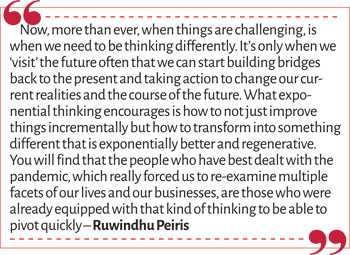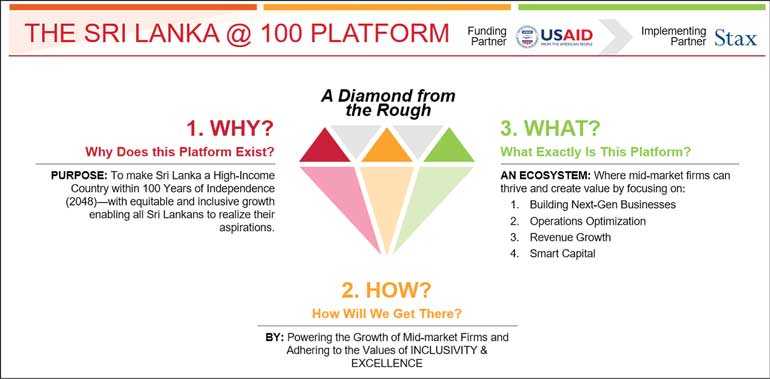Wednesday Feb 18, 2026
Wednesday Feb 18, 2026
Wednesday, 21 April 2021 00:00 - - {{hitsCtrl.values.hits}}

Kumudu Gunasekara

Ruwindhu Peiris
Sri Lanka@100 is a business development platform that was launched in 2019. Their audacious goal is to play a small (but impactful) part in making Sri Lanka a high-income country by 2048, when we celebrate 100 years of independence. They hope to achieve this goal by helping mid-market businesses to thrive and grow exponentially.
This private sector-led initiative—which is currently funded by the US Government’s development arm, the United States Agency for International Development (USAID)—helps high potential SMEs to optimise internal operations, enhance product portfolio, access new markets, attract smart capital, and create next-generation businesses.
How is it that they are talking about not just growth but exponential growth in such a challenging time? The Daily FT caught up with the Sri Lanka@100 founders—Kumudu Gunasekara, Ph.D., and Ruwindhu Peiris—to find out.
 Q: What is Sri Lanka@100 about? How did this platform come into being?
Q: What is Sri Lanka@100 about? How did this platform come into being?
Kumudu Gunasekara (KG): Sri Lanka@100 was born out of a belief that within 100 years of independence, we can become a high-income nation, driven by equitable and inclusive growth. Simply put, we believe that just because we were born in a developing country, we don’t have to continue to live in one. The direction that this country heads in is something that we all have a say in; be it in the private sector, government, or civil society. While all three elements are important, we are concentrating on how we in the private sector can help. Sri Lanka has always had potential, and we talk a lot about the past and how that potential was wasted…of how we should have been Singapore. But only the present and the future are within our control – that is what this platform is focused on.
Ruwindhu Peiris (RP): Both Kumudu and I made a choice at a certain point in our careers to return to Sri Lanka, having lived as expatriates for many years in Western countries. This was because we believed in this country’s potential and that the future will be Asian, and specifically because we wanted to contribute to developing that potential. We are privileged to have had that experience overseas and to have certain skills and resources that can be helpful in steering businesses forward. So, this is our way of driving and engaging with the development of this country in a long-term, inclusive manner.
And that’s not just lip-service – we are very cognisant of the inequalities within the business world, and we are making a deliberate effort to ensure that it’s not just companies in Colombo that are benefiting. We are also excited to be getting an opportunity, through this platform, to work with many high potential women-owned and -managed businesses.
Q: 2048 is not really that far away. How do you see us achieving this goal within such a short time?
KG: By focusing on the area where we can have the biggest impact and really move the needle – by powering the growth of high potential mid-sized firms. Ruwindhu and I are both directors at Stax as well. Like he said, we are blessed to have the skills and resources to work with and guide the best and largest global private equity and Fortune 500 companies. But Sri Lankan mid-sized firms, unfortunately, are most often unable to access this type of advisory and implementation services to take their business to the next level. Through this platform—and with the investment from the American people through USAID towards this shared vision of achieving advanced economic status for Sri Lanka—we are now able to provide such high-calibre services free of charge to qualifying companies. This is where we feel we can have outsized impact – many of our mid-market firms just need a little bit of support to take them to their next wave of growth. So, that’s why we are focusing on mid-sized companies to take on board as our portfolio companies.
RP: But that doesn’t mean that we’re ignoring smaller businesses. We see ourselves as also being instrumental in building more global companies based in Sri Lanka. At Stax, we work with the biggest private equity firms in the world, who would like to invest in Sri Lankan companies, but have found that most of our firms are still not ready to start competing at that level. We will work with our Portfolio companies to nurture their global ambitions first, but we have two other tiers of companies – the Associate and the Network levels. We are confident that the Associate level companies will be able to scale up considerably over the next three to five years, and the Network level businesses over the next decade. So, we are gradually building a pipeline of companies that can attract global investors and customers in this journey to 2048.
We know that in the past few decades, US companies have invested over $ 300 million in Sri Lanka, but in the next few decades we have the opportunity to grow that amount exponentially, by building world-class products and services. After this terrible pandemic, global businesses will be looking to de-risk their investments from China, and I see even more potential for us to attract these investors, particularly in light manufacturing.
Q: Are you focusing on any specific industry/industries through this platform?
KG: No, we’re industry agnostic. The companies that we are supporting fall into a broad range of industries from agriculture to technology to manufacturing. What we assess is whether there is potential to scale up, no matter what the industry is. We go through a thorough vetting and due diligence process, and we take the time to understand the ambitions and outlook of the senior leadership of the companies that apply to join our platform. We have strong support from USAID as well throughout this process, and everything from the due diligence criteria to the pitch meetings to ensuring of company data privacy are all at an international standard. What matters most to us is that there is ‘fire-in-the-belly’ and a can-do attitude towards accelerating their growth trajectory.
 Q: Tell us a little bit about your current portfolio companies.
Q: Tell us a little bit about your current portfolio companies.
RP: We have currently onboarded seven companies and we have a great mix, not just across industries but also in terms of business model and geographic spread too. For example, our Portfolio includes a 100-year-old family bakery and retail business called DD Atukorala from Kegalle; an agricultural equipment provider in Polonnaruwa, Randeepa Agrarian, which is growing rapidly; and a fintech that only recently was in the Stanford Seed Program, InsureMe. We are working with several brands that Sri Lankan consumers will be familiar with – McCurrie, Saaraketha for example – and some who are already making a name for themselves abroad, like Halpé Tea and Industrial Stainless-Steel Fabrications, which supplies sophisticated process machinery to global markets. What all our portfolio companies have in common is their demonstrated hunger to grow, and that they all reflect the soul of Sri Lanka’s ingenuity.
Q: How can people get involved in your platform?
KG: A business-owner of any kind, even of a small- or micro-enterprise, can reach out to us and understand more about the benefits of joining the platform. Anyone can also nominate high-potential companies that the Platform should consider, as we have two rounds of applications happening each year where we onboard more portfolio companies. Finally, we encourage youth and individual professionals to join us as volunteers if they are interested in helping companies to grow by applying their specific skillsets and mentoring in relevant fields.
Q: SL@100 is holding an upcoming webinar on 28 April at 5:30 p.m. on exponential thinking – why is this an important topic and who should attend?
RP: This is a free, public webinar that I think everyone should attend, because the exponential mindset can affect your outlook on your entire life, not only your work or business. Personally, and through all my business ventures, I have spent a lot of time thinking about and executing upon ideas of exponential growth. Encouraging this mindset and an essentially optimistic way of thinking about the future is fundamental to what we stand for at Sri Lanka@100, and it really underpins how we think about setting and achieving goals. I truly believe that it is only when a large share of companies and individuals in our country start thinking in this way and believing in the power of an exponential mindset, that we will start to see transformational growth.
Q: Can we really be thinking about exponential growth in such a challenging time for our economy?
RP: So, the specific topic of the webinar is, ‘In an exponential world, your future is more important than your past.’ Now, more than ever, when things are challenging, is when we need to be thinking differently. It’s only when we ‘visit’ the future often that we can start building bridges back to the present and taking action to change our current realities and the course of the future. What exponential thinking encourages is how to not just improve things incrementally but how to transform into something different that is exponentially better and regenerative. You will find that the people who have best dealt with the pandemic, which really forced us to re-examine multiple facets of our lives and our businesses, are those who were already equipped with that kind of thinking to be able to pivot quickly.
KG: I mentioned this in the beginning too, that we often dwell on the past. It’s fine to stop and take a moment to reflect; we have a lot of history to be proud of as well as a shared experience of overcoming many, many challenges in the past. Saying that Sri Lankans have had it rough is an understatement. But we are incredibly resilient as a people, as a nation, because we have had to overcome so many obstacles. We have all heard that diamonds are formed when coal is subjected to a tremendous amount of pressure, right? It is a natural process of spectacular transformation. We have no doubt that we are also capable of such a transformation, as a country, if we look to the future through an exponential lens.
For contact information and to find out more about the upcoming webinar, please visit https://srilanka100.lk/.
